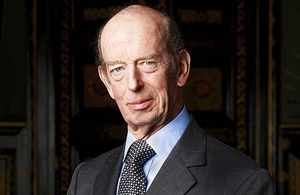HRH The Duke of Kent receives Dresden Peace Prize
HRH The Duke of Kent's acceptance speech on receiving the 2015 Dresden Peace Prize for his contribution to British-German reconciliation.

The Duke of Kent. Copyright: Royal Collection Trust/ © Her Majesty Queen Elizabeth II 2015
Acceptance speech held by HRH The Duke of Kent
The Dresden International Peace Prize for 2015
14 February 2015
First of all thank you for your very kind words, Herr Professor Biedenkopf.
I need hardly tell you what an enormous honour it is for me to be presented with this prestigious International Peace Prize. I feel that my own contribution, such as it is, to the achievements that this award recognises is but a very small part of a huge amount of work on the part of the Dresden Trust over many years in the name of reconciliation and friendship between the people of Britain and those of Dresden and Saxony. As you may know, The Trust was launched as a response to the Ruf aus Dresden to help rebuild the Frauenkirche as a monument to all who suffered from aerial bombardments in WWII. Amongst a number of other projects, it financed and gifted the Orb and Cross that now crown the dome of the Church. Its work continues today, furthering cultural exchanges between the city and Britain, and funding commemorative infrastructure projects.
This is the sixth time I have visited Dresden since I first came here for the 50th Anniversary of the destruction of Dresden in 1995, when you, Herr Biedenkopf, were kind enough to welcome me. It is always a great pleasure to be here and to see how much has changed over those years and to observe the progress made in the restoration of this city. In 1995 the Frauenkirche was still a ruin and the decision to rebuild it had yet to be made. I can never forget the sight of the rebuilt church at the time of its reconsecration in 2005, so it was wonderful for me to see this glorious building again yesterday in the very moving ceremony of remembrance that you, Madame Mayor, organised.
It has long been important for me to be involved in fostering Anglo-German relations – as some of you know I am also Patron of the British German Association which shares many of the underlying aims of The Dresden Trust. Ever since I first spent time in Germany as a young officer in the British Army, I have seen and admired at first hand the way this country has developed over the past sixty years, looking positively to the future and putting the stability of Europe first.
Ladies and Gentlemen, WWII anniversaries are now an occasion for joint remembrance: an opportunity to pause and reflect on the horrors of war; to mourn and commemorate those who lost or gave their lives; to display our solidarity with those who survived. Both Dresden and Coventry suffered terrible and tragic losses. Aerial bombardment of British and German cities caused destruction on an immense scale. The wounds that war inflicted on our nations went deep. We gathered yesterday to remember one such tragic event, the destruction of Dresden by the firestorm of 13 February 1945.
I should like to take this opportunity to remember all those who died, all who were made homeless, all who suffered the long-lasting effects of what happened that night. The loss of the beautiful city of Dresden was a terrible outcome of the effort to liberate Germany from the Nazi dictatorship.
I also pay tribute to the partnership that emerged out of those dark days. The relationship between Dresden and Coventry, twinned since 1959, is a fine example of reconciliation. The reconstructed Frauenkirche is a lasting symbol of the British-German friendship which grew out of the ashes. In remembering the past, we must look to the future and reinforce the message to the younger generation: never again.